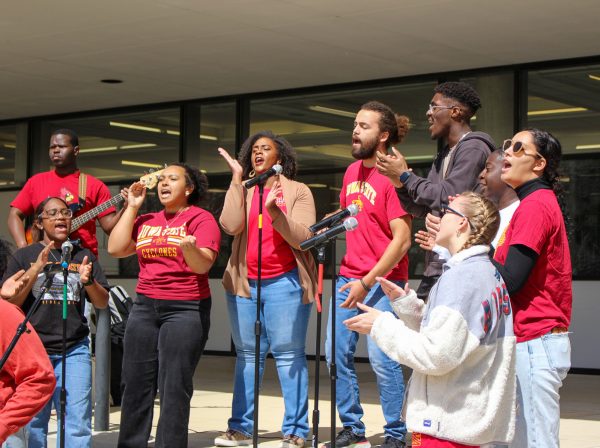The ups and downs of being born on leap day
February 26, 2020
The chances of being born on leap day are so rare that less than 0.1 percent of the world’s population is born on February 29.
Our calendar’s need for a leap day every four years can be confusing, but leap day is extremely necessary.
“These additional 24 hours are built into the calendar to ensure that it stays in line with the Earth’s movement around the Sun,” according to History.com. “While the modern calendar contains 365 days, the actual time it takes for Earth to orbit its star is slightly longer—roughly 365.2421 days.”
A couple of the world’s leap babies, or leaplings, according to the elite clubs that have been created over the years, happen to be Iowa State students, one being a men’s basketball player.
Tyrese Haliburton, sophomore in business management, will be turning five years old this year thanks to his unique birthday: Feb. 29, 2000. Haliburton says that while it can be tricky, he likes having this birthday because it makes him special.
“I always thought it was cool because people always thought it was interesting and was always a good ice breaker,” Haliburton said. “I still like it because it’s just different. It’s cool to me that when leap years get brought up, I’m usually the first person to pop into a lot of people’s heads.”
While being different is fun, having a birthday that only happens once every four years can get challenging and confusing. What day do you celebrate on for non-leap years? Are you actually turning 20, or are you still five?
“On non-leap years we would celebrate on the 28th,” Haliburton said. “We usually would celebrate by going to IHOP for dinner growing up because that is my favorite restaurant.”
Most people think this is where the issues for leaplings end, but Haliburton pointed out that troubles go beyond celebration plans.
“I got kicked off Twitter for changing my birthday to my real day so I had to make a whole new Twitter,” Haliburton said. “It hurts not having my old Twitter and the old tweets but it’s a fun story. When I made the new Twitter I was able to use my real birthday, but it sucks because on non-leap years, social media platforms never really recognize my birthday.”
Haliburton isn’t the only leapling at Iowa State who has challenges thanks to their birthday. Ashlynn Wiley, junior in psychology, has had her fair share of misfortunes as well.
“When I was in kindergarten we were sharing our birthdays,” Wiley said. “So I said mine was February 29th. My teacher told me that wasn’t possible, because that day didn’t exist. So as little kids do, I cried. Then when I went home I was mad at my parents, thinking they lied to me about my birthday.”
To avoid situations like Wiley’s, in some countries it isn’t even possible to have a birthday on a leap day. In Hong Kong, all babies born on Feb. 29 are given the birthday of March 1 on their birth certificate, to keep from legal confusion.
Wiley’s issues of being a leapling went past her kindergarten trauma, and still affect her as a college student.
“I’ve also gone to apply for things like scholarships, where you have to put in your date of birth, and then been told that I’ve put in an invalid date,” Wiley said.
Wiley said when she was younger, she often wished she had a birthday that occurred every year, because it definitely would’ve made things easier. But, as she’s gotten older she’s learned her birthday isn’t the worst thing in the world, and is actually kind of cool. Like Haliburton, Wiley said she always has an interesting ice breaker if need be.
Wiley said at this point, celebrating her birthday is pretty much the same for her as everyone else. But, it really depends on the year.
“Sometimes the 28th is more convenient, sometimes the 1st is,” Wiley said. “Typically, people celebrate birthdays on the weekend even if it’s during the week so it’s really not all that different. On years I actually have a birthday, my family usually makes a bigger deal out of it.”
While Haliburton and Wiley might see their birthday as a pain sometimes, a lot of the world associates Feb. 29 with luck, love, marriage proposals and more.
“Tradition holds that in 5th-century Ireland, St. Bridget lamented to St. Patrick that women were not allowed to propose marriage to men,” according to History.com. “Legend has it that St. Patrick designated the only day that does not occur annually, February 29, as a day on which women would be allowed to propose to men. In some places, Leap Day thus became known as Bachelor’s Day.”
The tradition even reached England, but with a twist. If a man were to reject a woman’s proposal on Feb. 29, he owed her a large debt. Today, Feb. 29 is filled with all sorts of superstitions, both good and bad. The Greeks even consider marriage on leap day bad luck, a superstition still seriously followed.


















dolores | Feb 24, 2024 at 12:00 pm
I am 80 years old born on leap year February 29. Problem DMV can put February 28 or March 1st as renewable for my drivers license. But the computer put a red flag stating wrong date. Some times I explain about Leap year and DMV can put the date they want to and its legal for my Drivers license.